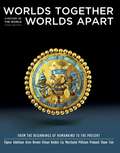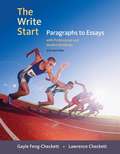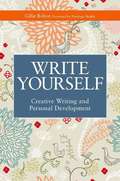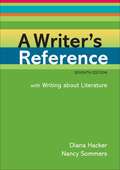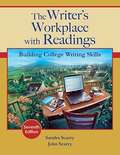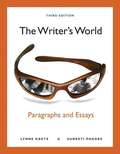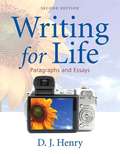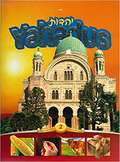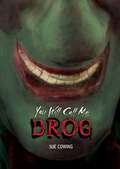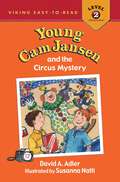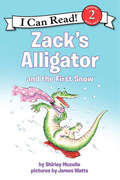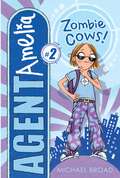- Table View
- List View
World Studies (3rd Edition)
by Dennis BollingerWorld Studies Student Text begins with a brief review of history from Creation to the coming of Christ and progresses in a chronological journey around the world studying the ebb and flow of empires, cultures, Christianity, and world religions. It concludes with an examination of the trends of the emerging 21st century.
The World War II Years
by Cathleen Schurr Charles HipserIt's September 3, 1939, and England and France have just declared war on Germany. Aboard the Athenia, Cathleen is a victim of a Nazi submarine torpedo. How will she survive? Some of six-year-old Charles's treasures are bullets, grenades, and artillery shells. What was it like growing up in German-occupied France during World War II? Read these memoirs to find out.
Worlds Together, Worlds Apart: A History of the World from the Beginnings of Humankind to the Present (Third Edition)
by Robert Tignor Jeremy Adelman Stephen Aron Peter Brown Benjamin Elman Stephen Kotkin Xinru Liu Suzanne Marchand Holly Pittman Gyan Prakash Brent Shaw Michael TsinWith the Third Edition, Worlds Together, Worlds Apart continues to offer a highly coherent, cutting-edge survey of the field, while becoming more streamlined and accessible for a wider range of students. The Third Edition offers a number of improvements over the first two.
Wright Group Lead 21 Theme Reader (Wright Group Lead 21)
by Wright GroupImprove your literature skills with Wright Group Lead 21 Theme Reader. It contains interesting narratives and questions at the end of every unit to test your comprehension skills.
The Write Start: Paragraphs to Essays With Student and Professional Readings (Fourth Edition)
by Gayle Feng-Checkett Lawrence CheckettTHE WRITE START: PARAGRAPHS TO ESSAYS introduces the developing writer to the basic elements necessary for writing effective essays in the academic environment. The Fourth Edition focuses first on writing paragraphs that express thoughts about a topic, then on expanding the topic to the longer essay format. These skills will help students communicate more effectively and prepare them for the rigors of their first college-level composition course.
Write Yourself: Creative Writing and Personal Development
by Gillie BoltonWrite Yourself is the ideal introduction to how to facilitate groups and individuals in finding inspiration for their creative personal writing voices. This book explains how and why writing is such an illuminative, healing, and cathartic process, and provides many practical exercises that encourage the exploration of emotions, memories and experiences. Chapters cover the use of writing with a variety of client groups, including those made up of people suffering from depression, anxiety or health problems, and advice is given both on running and participating in successful writing groups. This book will be an invaluable resource for professionals working across the health, social care and caring professions, arts therapists and for everyone interested in the therapeutic qualities of creative writing.
A Writer's Reference: With Writing About Literature
by Diana Hacker Nancy SommersThis version of the best selling college handbook includes a tabbed section called Writing about Literature, a practical guide to interpreting works of literature and to planning, composing, and documenting papers about literature. Students will find help with forming and supporting an interpretation, avoiding plot summary, integrating quotations from a literary work, observing the conventions of literature papers, and using secondary sources. Writing about Literature also includes two sample student essays — one that uses primary sources and one that uses primary and secondary sources. The full primary texts are also included.
The Writer's Workplace with Readings: Building College Writing Skills (7th Edition)
by Sandra Scarry John ScarryFor more than 20 years, THE WRITER'S WORKPLACE has served the needs of more than half a million two- and four-year students as they have worked their way toward rewarding careers in a variety of fields. Sandra Scarry and John Scarry present writing instruction in a clear and inviting form, with step-by-step explanations to help build and maintain students' confidence in their writing. The result of many years of classroom teaching and research, this comprehensive and time-tested resource reflects the authors' understanding that students are unique individuals, with diverse backgrounds and interests that must be accounted for as they engage in the writing process.
The Writer's World: Paragraphs and Essays (3rd Edition)
by Lynne Gaetz Suneeti PhadkeThe Writer's World series was written to address the diverse needs of today's students: students whose first language is not English, students who respond favorably to visuals, and students who have varying skill levels.
Writing and Grammar 7 (3rd Edition)
by June W. Cates Elizabeth Rose Kimberly Y. Stegall Dawn L. WatkinsWriting and grammar for Christian schools.
Writing and Grammar 8 (Third Edition): Student Worktext
by June W. Cates Elizabeth Rose Kimberly Y. Stegall Dawn L. WatkinsA practice oriented guide for grammar and sentences, with focus on writing activities. Some of the writing projects include photo essays, news report, character profile etc.
Writing For Life (Second Edition)
by D. J. HenryD. J. Henry wrote Writing for Life from the ground up for today's college student. The ground-breaking approach of combining instruction and visual tools makes writing, reading and thinking processes visible, and shows the processes rather than just telling students about them. Highly graphic layouts and unique visual pedagogy empower students to transfer the learning strategies they already use in interpreting the visual world to the task of writing.
Yahadus Curriculum Book 2
by Living LessonsZemanim, Noshimm Kedushah, and Hafloah <P><P>Living Lessons' flagship Yahadus curriculum gives a strong overview of the entire Torah over five years (fourth through eighth grade) with the mitzvos as a framework. <P><P> <P><P>Each year, students learn approximately 120 Mitzvos, and the curriculum adjusts in content, language and design to suit the target age level. The Rambam's order of the mitzvos, organized by subject, has been used, with rare exceptions. This logical sequence makes it much easier for children to connect to and retain the information. The curriculum starts in fourth grade with the mitzvos of Sefer Madda, and ends with Sefer Shoftim in eighth grade. There is one student textbook for each year. Four volumes are now available, with the fifth and final volume coming soon b'ezras Hashem. The textbooks are sturdy and designed to last for a number of years by the students in each grade. A two-part Teacher s Guide, as well as a workbook with activities is available for the students to use. While every school is constantly challenged to squeeze in everything they want to teach into their limited time resources - as they should be - this curriculum is a tremendous asset, as it can change the approach of the teachers and students to the entire learning process. The curriculum also covers many aspects of any Jewish Studies curriculum, being that it goes through all 613 mitzvos, and thus may free up some of the time needed for them. <P><P>It is designed to use approximately 90 minutes per week. The curriculum is built with much flexibility in the time it will use: It can be taught either in varying timeframes (1 - 2 longer sessions per week, or 3 - 4 shorter ones.) Much of the information is optional and the layout is designed to allow it to easily be included or omitted in classroom instruction based on time allowances. It reads easily and is visually attractive enough for students to take home and prepare varying amounts of the text before class. <P><P>Living Lessons is a grass-roots effort to create high-quality Torah learning materials for children. Benefiting from the latest educational methods, and without compromising our rich Mesorah, a group of dedicated individuals have undertaken the monumental task of preparing materials to make Torah engaging, meaningful and exciting to learn and teach. The first result of the this effort is the state-of-the-art Yahadus curriculum, designed by a team of Mechanchim and Mechanchos, Rabbonim, researchers, writers, designers, parents, and children. Other exciting projects are underway. Stay tuned for updates!
You Will Call Me Drog
by Sue CowingParker is a normal sixth grader—or he was normal before the puppet. It’s just an old hand puppet, sticking out of a garbage can, and even though Parker’s best friend says leave it, Parker brings the puppet home and tries it on. Or maybe it tries him on. “You will call me Drog!” the puppet commands once they’re alone. And now, no matter how hard Parker tries, he can’t get Drog off his hand. Drog is sarcastic, cruel, unpredictable, and loud—everything Parker isn’t. Worse yet, no one believes that Drog—not Parker—is the one saying the outrageous things that get Parker into trouble. Then Drog starts sharpening his snarky wit on the most fragile parts of Parker’s life—like his parents’ divorce. Parker’s shocked, but deep down he agrees with Drog a little. Perhaps Drog is saying things Parker wants to say after all. Maybe the only way to get rid of Drog is to truly listen to him.
Young Cam Jansen and the Circus Mystery (Young Cam Jansen #17)
by David A. AdlerCam and her friend Eric are having a great time at the circus with Aunt Molly - that is, until their box of popcorn goes missing. Did they lose it, or was it stolen? It's up to Cam and her photographic memory to figure it out!
You're on the Trail! (Reach Into Phonics Ser.)
by Donovan Brock Deanne W. Kells Deborah J. ShortNIMAC-sourced textbook
YOUT 201 Student Work Text: Survey of Youth Ministries (2nd Edition)
by Richard BrownLearn more about the principles of teaching young people about the Christian religion and engaging them with the church and ministry as a lifelong experience.
Yukon Adventures Magazine: Set of 6 (Readers' and Writers' Genre Workshop Ser.)
by Jeanette LeardiNIMAC-sourced textbook
Zack's Alligator and the First Snow (I Can Read Level 2)
by Shirley MozelleZack and Bridget are back for more gator-ific fun! Join these special friends as they embark upon an exciting winter wonderland adventure together. At first Bridget is only the size of a key chain. But when she gets soaked from the wet snow, she grows into a full-size alligator. It’s Bridget’s first real winter, and the zany gator embraces the experience—from ice-skating to sledding to making a “gator angel” in the snow.This hilarious Level Two I Can Read is geared toward kids who can read on their own but still need a little help.
Zombie Cows! (Agent Amelia #2)
by MIchael BroadSecret agent Amelia Kidd has saved the world loads of times from evil geniuses and criminal masterminds—thanks to her great disguises, gadgets (which sometimes work), and her brilliance at improvising in sticky situations. The three secret agent case files in this book are: The Case of the Zombie Cows, in which Amelia visits a petting zoo where she’s chased by tick-tocking cows into the yard of pecking clockwork chickens! Time for another dastardly plan to rule the world to be stopped, with Agent Amelia on the clock. The Case of the Perilous Pipe, in which a new music teacher uses an enchanted pipe to make all the children follow her. Could it be the notorious Pied Piper’s pipe? Trust Amelia to crack the spell, though! The Case of the Creepy Cakes, in which an innocent desire for a doughnut uncovers a fiendish plot to take over the world! As the cream from exploding cakes in the bakery smothers every surface, Amelia can be sure she has uncovered the villains!
Zoology
by Stephen A. Miller John P. HarleyThe new 7th edition of "Zoology" continues to offer students an introductory general zoology text that is manageable in size and adaptable to a variety of course formats. It is a principles-oriented text written for the non-majors or the combined course, presented at the freshman and sophomore level. "Zoology" is organized into three parts. Part One covers the common life processes, including cell and tissue structure and function, the genetic basis of evolution, and the evolutionary and ecological principles that unify all life. Part Two is the survey of protists and animals, emphasizing evolutionary and ecological relationships, aspects of animal organization that unite major animal phyla, and animal adaptations. Part Three covers animal form and function using a comparative approach. This approach includes descriptions and full-color artwork that depict evolutionary changes in the structure and function of selected organ systems.

